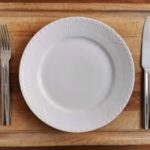Estimated reading time: 2 minute(s)
We’ve made it! We have been fasting for 18 hours and are ready to eat! Technically, it’s breakfast, even though it’s two o’clock in the afternoon, because breakfast- literally means “to stop fasting”, no matter what time of the day you do it 😉
Be careful! This is when it is even more important to watch what you put in your mouth.
Remember that your stomach is empty, the organism is clean and anything you put into it will be absorbed quickly. So, what do you want to nourish yourself with? This is a question I ask myself whenever I go to break my fast and the answer always is that I want to give my body the best.
How do I do that? By choosing a meal that combines two things: high quality protein and healthy fats, but at the same time is light, easy to digest so as to not overwhelm my digestive system.

Goals of Breakfast
- Hydrate: I recommend a green vegetable juice (packed with more veggies than fruit).
- Nourish: always choose recipes that are high in protein and healthy fats. For example, some oatmeal, an omelet…
- Replenish: we want the first meal we eat to give us energy and replenish the nutrients and electrolytes that we may have lost during the fast.
- Filling: if we make sure to eat a balanced and complete meal, it will be easier to avoid unhealthy snacks a few hours later.
- Balanced: it’s important to ensure that the first meal we eat doesn’t cause glucose and insulin spikes.
Foods to avoid when breaking your fast
- Sugar: pastries, cookies, white bread, sugary yogurts and juices… All of these things increase the concentration of glucose in the blood and cause the pancreas to secrete insulin.
- Processed foods: full of sugar, additives and saturated fats. They are what we call “empty” foods, they have zero value from a nutritional point of view.
- Alcohol: it may sound crazy but I have seen people who have a glass of wine after intermittent fasting. We should consider alcohol as toxic, a poison. Consuming alcohol from a health perspective is never advisable, but even more so after fasting. On an empty stomach, alcohol flows through the bloodstream quicker and has worse toxic effects on the brain.
- Fiber: an excess of fiber during the first meal after your fast can cause inflammation, abdominal bloating and discomfort.

Don’t overdo it by eating too much
One of the most common things to happen when we first experiment with fasting is to get anxious. In fact, I’ve heard people talk about how some people start to think about food all the time, or that they can’t sleep because of their fast.
These kinds of feelings can make it hard once we have finished fasting, because oftentimes we feel that the flood gates are open and we can eat anything and everything. But be warned, you definitely shouldn’t eat twice as much just because you’ve fasted. If you do, you will be wasting all of the effort you made fasting as you will not reap any of the benefits.
The truth is that in most cases hunger is mental or emotional, not physical. Therefore, fasting seems to me to be a very good way to start to recognize the difference between different types of hunger.
My suggestions on what to eat when breaking your fast
- Smoothies: by blending the ingredients, they are easier to digest. I recommend choosing combos that include more veggies than fruit so that your insulin levels don’t spike.
- Creams and soups: But always made with pre-cooked ingredients, which are better than raw in this case. The objective is the same: something that is quick and easy to fix and high in nutrients.
- Dried Fruits Did you know that in Saudi Arabia they eat a lot of dates to break their fast because they provide the body with instant energy and maintain blood sugar levels? I usually go for the Raw Cocoa Bar, which contains both dates and raisins.
- Proteins and Healthy fats: my favorites are egg and avocado. Also, butter. These are all rich in Omega 3 and are very beneficial for heart health, blood levels, joints, skin, eyesight, and even the brain. One of my absolute go-to treats is a good spoonful of Organic Peanut Butter on whatever I’m eating for breakfast: it is great on toast, pancakes, oatmeal, and even omelets.
- Cocoa: it’s high protein and fat content along with it’s high energy content, make it an essentially. In addition, caffeine and theobromine increase attention levels and magnesium delays fatigue. Can you think of a better way to break your fast than with an ounce of chocolate?
Oatmeal Chocolate Pancakes
Benedict Eggs
Carrot and Nut Energy Bars + A Vegan Smoothie
Savory Porridge
Oatmeal, Banana and Chocolate Muffins
Cookies with a Nut-based Cream
Avocado, Ham and Asparagus Omelet













